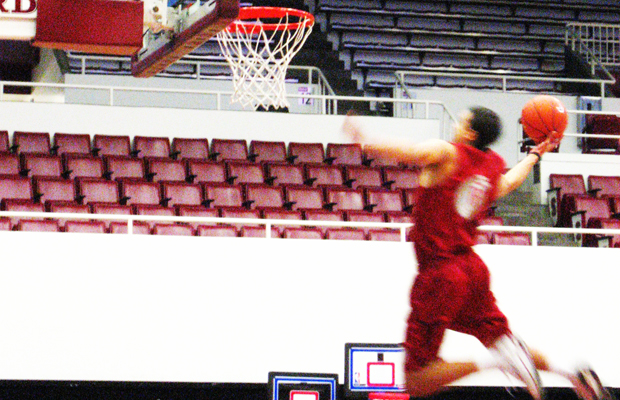When it comes to predicting March Madness winners, who knows best: experts, algorithms, or the crowd?

An estimated 45% of Americans will fill out an NCAA tournament bracket this year. That’s more than the number of people who voted in the 2010 midterm elections. And until the clock strikes 12:15 p.m. on March 15, and actual balls start being thrown at actual baskets, each and every one of us can pretend to be the smartest guy or gal in the room when it comes to making March Madness predictions.
But who (or what) really knows best? Last month, we looked at algorithmic, social, and expert approaches to predicting Oscar winners and determined that a combination of expert opinion and algorithmic analysis was the most successful tactic. Now, on the eve of America’s favorite predictive orgy, March Madness, we ask the question again: Are the best predictors robots, writers, or the crowd at-large?
Surely, the people who are paid to watch college basketball for a living know what they’re doing, right? But while all but one of CBS Sports’ expert analysts expects Kentucky to win it all, the predictions vary wildly beyond the championship game. Furthermore, the experts may be more likely to choose upsets because, hey, they’re paid to know something the rest of the world doesn’t. And what better way to prove that than to throw outlandish upsets at the wall and see what sticks? The trouble is, while upsets are bound to happen, they’re usually not the upsets we predict. According to a study conducted by Indiana University (the 4th seed in the South region, by the way), you’ll have an equal or better success rate by trusting the Selection Committee's seeding and picking zero upsets, regardless of your sports expertise. But since that’s no fun, let’s look at a couple other approaches.
A second option is to put your trust in the wisdom of the crowd. The bloggers at Hoopism have compiled data from the betting information service Sports Insights to display the percentage of real bets placed for or against each team. But since the data is based on actual wagers, the site only contains predictions for early games in which the teams are already decided.
That leaves us with the algorithmic approach, and few have seen more computer-based predictive models than Danny Tarlow and Lee-Ming Zen. Like many, Tarlow and Zen run an annual NCAA tournament pool. But what makes theirs unique is that each entry must be compiled by a machine with no consideration for human judgment.
“Three years ago, I had two things on my mind,” said Tarlow, a PhD student in Computer Science at the University of Toronto. “First, I was working on building a recommendation system similar to the ones used in the Netflix challenge. Second, I hadn't paid attention to college basketball that year, but I needed to fill out my bracket for a pool with some friends. At some point, it struck me that I could use the exact same recommendation algorithm I had been coding up to make my bracket predictions.”
Tarlow went on to explain how the computers fared against their human counterparts in last year’s competition. “We included three human-ish baselines: always picking the higher seed, the bracket predicted by Nate Silver, and Lee's personal bracket. Against that field, the machines won.” (For the uninitiated, the New York Times’ Nate Silver creates a bracket each year combining human- and computer-based systems.)
Tarlow and Zen both agree that while the success rate of each algorithmic approach can vary greatly, the computers are getting better every year. "The approaches and setups definitely become more sophisticated," said Zen. "But even then, we're only scratching at the surface."
Tarlow agreed that they still have a long way to go. “I'll just say that I haven't taken my bank account and headed off for Vegas yet,” he said.
You don’t need to create your own algorithm to get a little robotic assistance for your bracket. There are plenty of free computer-based predictive models out there, from numberFire to Power Rank (which displays its predictions in an attractive visualization). But if there's one thing most of the predictors agree with, human or otherwise, it's that the smart money is on No. 1 overall seed Kentucky to take home the championship trophy. Then again, ESPN is quick to point out that the No. 1 overall seed has only won once since the committee started handing out that distinction eight years ago.
All of this reveals what we already secretly knew, even if our pre-tournament egos try to tell us otherwise: There’s no foolproof method to sports prediction, no matter how knowledgable the human, or how advanced the algorithm. So America, stop agonizing over your bracket and get back to work.
[Image: Flickr user Erik Charlton]